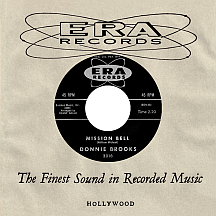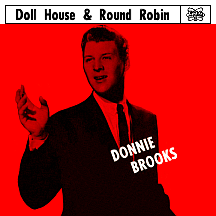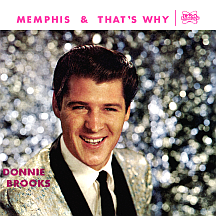DONNIE BROOKS
Mission Bell
A donnybrook, according to the liner notes of The Happiest..., the 1960 Era Records album by Donnie Brooks, is defined as "a riotous occasion." Various dictionaires describe the word as a quarrel, dispute, argument, fracas, melee, brawl, slugfest, free-for-all or battle royal (ending in police intervention and/or jail time)! The point is obscured by the impression young Donnie the singer conveys through the LP's hits "Mission Bell" and "Doll House" (both suggesting the opposite: kindness, affection, empathy). Donnie (real name: John Abohosh), who convincingly delivered lyrics like 'Give me your heart of gold, your heavenly magic touch, to cherish have and hold, I need your love so much' on the abovementioned "Mission Bell," couldn't possibly have been as rough-and-tumble as his stage name suggested. Or could he? Turns out this congenial young gentleman had a wild side prior to the softening-of-the-arteries that engineered his ascendance to the best seller lists. Talkin' rock and roll!
The Dallas, Texas teen moved to Ojai, California in the 1950s. While attending college in Ventura, he began singing in area clubs prior to making a short southeastern beeline for Hollywood and its myriad of record companies doing business out of tiny offices on Melrose or Sunset or even Hollywood Boulevard, where Era ran its operation. In 1957, after singing on some demo recordings, he debuted on a much smaller label, Fable, as Johnny Faire (short for Faircloth, his stepfather's name), with a pair of solid rock singles, "Make Up Your Mind Baby" and "You Gotta Walk the Line." Johnny held steady with the best of the bellowing rockers and nearly had a hit (a minor one, at least) with "Bertha Lou," a song written by John Marascalco (who'd made his mark penning hits for Little Richard), that had been recorded by Dorsey Burnette for Cee-Jam (a label so small it couldn't afford a cubbyhole on a major Tinsel Town avenue, opting instead for a rental unit on Tuxedo Terrace, a winding side street near Canyon Drive). Using the same instrumental track as Burnette, Faire's rapid-fire vocals came off slightly higher-pitched and more reckless on his late-'57 version for Surf Records. Sadly, both singles wound up in the landfill when east coaster Clint Miller's cover on ABC-Paramount became the one favored by deejays.
Wailing to a flute-and-whispering-girls background actually worked on "Betcha' I Getcha'," the final Faire disc. Era boss Herb Newman took notice and signed Johnny; his first single for the label was "Hollywood Party," a not-to-be-missed spring '58 workout with a vocal so deranged it made his voice hoarse. The name Dick Bush was used on this single as a joke, carrying the incognito ploy to extreme. The vocal was nearly as crazed on the flip, "Ezactly," which reused the flute gimmick and offered moments of jumbled elation. Even a purported ballad, "Don't Cry Little Baby," had a bent sensibility; this one appeared on the Jolt label by Johnny Jordan. Someone was repeatedly throwing something at the wall to see what would stick. When listening to these hidden treasures, more words from the dictionary come to mind: overblown, excessive...exciting!
Johnny settled in at Era in '59, recording the change-of-pace "Li'l Sweetheart," the first under what would be his permanent moniker, Donnie Brooks, suggested to him for the "riotous" reason already alluded to. Few people connected this Brooks guy to his earlier aliases...assuming they'd even heard any of the songs. The next single, "White Orchid," a somber, spoken "teen death" record, had some minor success that fall on the west coast (particularly in Portland, where it went top ten, which explains why I've been seeing the 45 in record bins for years). Afterwards, the uptempo (but not nearly as frantic as earlier non-Donnie efforts) "The Devil Ain't a Man" failed to generate enthusiasm. He hit pay dirt with "Mission Bell" (originally titled "Wishing Well"), written by William Michael (an earlier Johnny Jordan song, "Sweet, Sweet, Sweet," was his as well) with at least one added line ('...taller than the tallest tree...,' inspired by pal and belated labelmate Burnette's recent hit "(There Was A) Tall Oak Tree"). After a slow, steady two-month climb, the single reached the top ten in August 1960.
For an encore, Donnie dispensed a Lou Duhig-Ruby Berry song about building a "Doll House" (with ...'a hammer, nail and a hunk o' wood') and worked his way back into the top 40 at the end of December. Its B side, love song "Round Robin," siphoned off a little of the airplay action. Cute-sounding female backing singers had a frequent presence on the singles of this period. 24-year-old Johnny/Donnie, once a full-grown rock and roller, had turned the clock back to his teens! A Jesse Hodges ditty about the girls from around the land, "Memphis" in particular, made a quick stop on the charts in March '61. Several unsuccessful singles took Brooks through '62's missile crisis before he parted ways (but not forever) with Herb Newman and Era Records.
After a year's hiatus (he was spotted playing numerous dives in small Southern Cal cities), Donnie (hanging on to the name the rest of the way) signed with Reprise. In early 1964 he released a remake of "Girl Machine" (it had been a mainly-west-coast hit on Warner Bros. for Johnny Walsh at about the time Brooks' "Bell" was much bigger), produced by Jimmy Bowen and arranged by David Gates. During his year at Reprise, Donnie worked with other professional hitmakers (Ernie Freeman, Jack Nitzsche), but no hits were forthcoming. A minor detour into movies began at that time with a role in Get Yourself a College Girl, a silver screen vehicle for Mary Ann Mobley. He appeared in A Swingin' Summer singing "Penny the Poo" ('...she's so ooooo!') and had a fleeting moment in 1967's freak-out hippie flick The Love-Ins.
In 1966 he was granted permission to wander the hallways at Challenge Records, where Jerry Fuller produced a couple of singles (including John Lennon and Paul McCartney's "I Call Your Name") to further public disinterest. Other projects came sporadically; a Vietnam-related folk song, "Blue Soldier," was issued on Era in 1968, as was a rousing version of Joe South's "Hush" (Billy Joe Royal had done it earlier), which became a major hit for Deep Purple. In 1970 he was on the Happy Tiger label (distributed by Era), capping his time there in '71 with the oft-recorded Jerry Ross-Ken Gamble-Jerry Williams standard "I'm Gonna Make You Love Me." Besides an occasional public performance, for the next 36 years he led a no-showbiz life. The leading dictionaries might call that stability. Or a humdrum existence. One thing's certain: he'd long since abandoned his crazy "donnybrook" ways.




